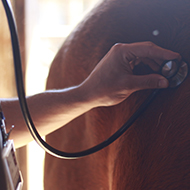Novel equine ECG technique gives hope for better stroke prevention in humans

Owing to its intermittent nature, PAF in horses is difficult to diagnose.
Researchers at the University of Surrey have discovered a new electrocardiogram (ECG) technique that can quickly detect a difficult-to-diagnose-condition in horses, that is also a major cause of stroke in humans.
Writing in the journal Nature Scientific Reports, researchers describe the technique, which can rapidly diagnose paroxysmal atrial fibrillation (PAF), a condition that causes rapid, erratic heartbeats.
Owing to the intermittent nature of the condition, PAF is tricky to diagnose and can impact a race horse's performance. In some cases, the condition can be fatal.
In humans, this abnormal heart rhythm can disrupt the blood flow in the upper two chambers of the heart, leading to the formation of blood clots. Such clots may then block blood vessels elsewhere in the body, including the brain, resulting in cognitive decline and stroke.
In the study, Dr Kamalan Jeevaratnam and his team obtain EGG recordings from healthy horses and those diagnosed with PAF. ECG traces with no other electrical disturbances were converted to a string of computational numbers using a range of detection algorithms.
The researchers found that ECG results recorded at rest, and processed by the novel detection method, were significantly different between horses with and without PAF. This allowed for the identification of horses with PAF from sinus-rhythm ECGs with high accuracy.
Scientists say that it is vital that PAF is identified in good time for treatment to be effective. Normal heart rhythm could be restored by electrical stimulation or antiarrhythmic drugs. Anti-coagulation drugs might prevent the formation of blood clots preventing strokes or greatly reduce their consequences.
“I am very happy to see that in horses we obtained such excellent results and came up with a tool which could be easily used even by a non-professional,” commented lead author of the study, Dr Vadim Alexeeno. “It was also very exciting to devise the new approach of ECG parsing, which is absolutely essential for high sensitivity and specificity of our method”.
Dr Jeevaratnam added: “The fascinating aspect of this study is that we are looking at the arrhythmia which typically is provoked by high heart rate, but we diagnose it looking at low heart rate recordings.
“There is no need to exercise the horse and the analysis could be done in minutes, using low power computers. As a clinician, I think such analysis will greatly facilitate detection of this arrhythmia and it will promote the use of ECG by my colleagues.”
Dr Jeevaratnam is in discussion with several other UK and US groups to further this research into human studies, while at the same time exploring the notion of partnering with device companies in the equine industry.



 The Animal and Plant Health Agency (APHA) has updated its online reporting service for dead wild birds.
The Animal and Plant Health Agency (APHA) has updated its online reporting service for dead wild birds.